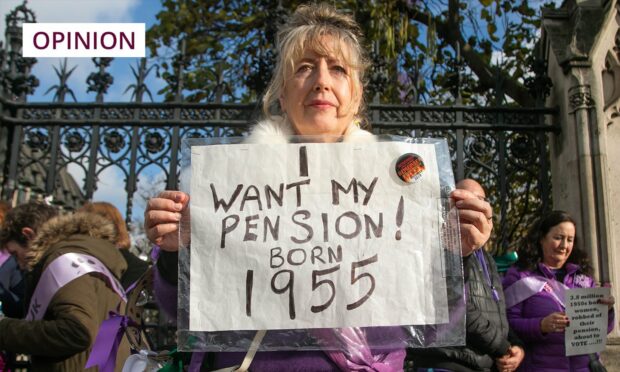At the last count, there were more than 40,000 “Waspi women” in the Highlands and north-east battling for justice over their pensions.
Well, it was the last time I checked.
I was looking at a digital counter displayed on a website by Waspi (Women Against State Pension Inequality).
It updates the number of Waspi women in the UK who died since their campaign started nearly 10 years ago.
This tally stood at 273,255 as I wrote – I’m sure that’s 26 more than when I looked the day before; it’s hard to keep up.
Many more will die before they receive compensation – if offered at all.
Telltale squirming by ministers and MPs – enjoying gold-plated pensions and privileges way beyond ordinary workers – was a bad sign.
They’ll do the only thing they are any good at: prevaricating for even longer than it takes for the cows to come home.
Perhaps that’s what the government has been banking on all along that the women will die off or give up – to avoid a taxpayer payout.
Time is a great healer, but in politics a great concealer.
Where scoundrels can hide as time slips by behind a fog of neverending inquiries and fading memories.
Look at the Iraq and Covid inquiries; now postmasters and Waspi.
So it feels like a significant yet pyrrhic victory for the Waspi campaigners after the parliamentary ombudsman’s condemnation of government incompetence over explaining pension-age increases to women born in the 1950s.
As the Tories prepare to crash out of office there are two hot pokers being waved at their backsides.
Brandished by the twin campaigns for justice by Waspi women and the country’s persecuted postmasters who will ensure the Tories look like rich feudal landlords grinding the peasants down.
Labour front-benchers used to shout that Waspi women were “robbed” and vowed to pay them back, but they have gone back on their word.
Yousaf in Scotland is an enthusiastic supporter, but he does not foot the bill.
The government fears paying billions in pension compensation on top of the cost of living crisis, and upsetting younger taxpayers.
From afar, younger people might assume wrongly it was all about women not wanting to retire at the same time as men, but the issue was actually with flawed processes employed by civil servants to prepare them for this event.
As the Institute for Government pointed out, there is a huge disconnect between policy decisions politicians obsess about in their own bubble and how little of that seeps into public consciousness without good communication.
Local campaigners complained they’ve had no communication
Local campaigners have maintained a high profile; several told the Press and Journal they had not received any direct communication from the government.
My wife did not realise at the time, but she also became a Waspi woman.
It would be wrong to suggest we weren’t aware that the 50s women’s retirement age was increasing, but could not recall anything specific relating to her.
What wrong-footed us were the subsequent actions of that strikingly undynamic duo Cameron and Clegg, whose coalition government accelerated the retirement age further from 65 to 66 with indecent haste.
My wife was caught out because she was eventually forced to retire early on medical grounds and had to make do without a state pension for a while due to the unexpected extended age extension to 66.
The government must have saved billions on women’s pensions at the time the controversial changes to state retirement ages were rushed through.
The Treasury has pocketed billions
The Waspi website is more specific: claiming that the Treasury has pocketed more than four billion pounds so far.
Therefore this is not about finding new money from taxpayers in compensation, but retrieving what was squirrelled away in government reserves in the first place.
We write off old people at our peril.
Someone even went as far as launching a parliamentary petition to make drivers retake their tests at 65 because they were supposedly such a danger on the roads.
It flopped; a few basic checks showed me government statistics which revealed the biggest liabilities were 30-49 drivers.
Defenceless older women and ageing postmasters must have mistakenly looked like soft targets at the time, who could be crushed easily.
The problem for Waspi is that the postmasters appear to be far higher up the pecking order in the public sympathy stakes.
There is also a complicated choice between blanket compensation being handed out to everyone or finding a way to identify the most deserving cases, the latter of which seems nigh on impossible for the government to achieve.
Taking their turn in the queue means many more will not live to see justice – and the clickometer might eventually die out itself.
David Knight is the long-serving former deputy editor of The Press and Journal



Conversation